- Home
- Nick Hornby
31 Songs Page 12
31 Songs Read online
Page 12
What is striking about the first couple of discs in the El Cancionero set is that, although Los Lobos can slip from one musical language into another with admirable ease, these languages never get confused. If ‘Guantanamera’ is played with a remarkable and un-ironic innocence, then the first original song in the collection, the generic ‘We’re Gonna Rock’, is as straight-ahead as anything by Jerry Lee Lewis. There is, initially, little interest in cross-pollination. This is one reason why it is perfectly possible to listen to great chunks of the five hours of music on El Cancionero without getting sick to death of it – you’re getting two bands for the price of one. Oddly enough, it isn’t until 1988, when Los Lobos were invited to contribute to Hal Willner’s strange and brilliant Stay Awake, a collection of Disney songs covered by an eclectic selection of artists (and of interest to your small children only if your small children are fans of Sun Ra and Tom Waits), that something distinctivc begins to emerge: the Los Lobos version of ‘I Wanna Be Like You’, from The Jungle Book, is slinky, percussive and funny, and wound over and under those liquid, pretty, and unmistakably Hispanic acoustic guitars is an utterly great and indisputably mainstream American sax solo from Steve Berlin.
Any song in which someone is obliged, as Cesar Rosas is, to sing the line ‘I’m the king of the swingers, the jungle VIP’ can make only modest claims for itself, but here it sounds like a defining Los Lobos moment. By contrast, ‘Will the Wolf Survive?’, from the band’s first full-length album, sounds like foursquare white rock, with only the faintest pinch of chili.
To point out that there is a clear distinction between two styles of music is not the same as saying that there is a lack of distinction in their execution. I cannot comment with any real confidence on the cumbias and the rest; the rock ’n’ roll, however, is played with verve, swing and fiery skill. Indeed, there is a moment on the first CD – the electrifying opening to ‘I Got Loaded’, which sounds like an R&B standard but isn’t ~ when you might find yourself asking whether anyone who has ever been smitten by pop music can fail to have his heart stopped by the chords, the swing and, once again, Steve Berlin’s wonderfully greasy sax. I suspect that there is a generation of young people out there to whom ‘I Got Loaded’ may sound like nothing more than a piece of Gap retro marketing, but the rest of us are likely to hear it as rock’s binary code.
The third disc of El Cancionero contains several tracks from Los Lobos’s richest and most ambitious album, Kiko, which is now nearly a decade old. Kiko is dressed up in one of classic rock’s sharper suits-’That Train Don’t Stop Here’ wouldn’t sound out of place on one of Van Morrison’s deep-grooved R&B albums, and you can hear the Band’s facial hair in the stately folk rock of ‘When the Circus Comes’ – but the instrumentation is more exotic than on anything similar from the same period, and the rhythm section provides a limber funk that is way beyond the grasp of most guitar rock acts. By this stage in their career, Los Lobos had learned how to fuse their two styles. There’s nothing quite like the intoxicating ‘Saint Behind the Glass’, during which a Veracruz harp cascades all over a skiffly bass and drum to create the kind of perfectly measured admixture that the band had been threatening for years.
If Kiko marked the peak of the band’s career, the descent since then has been gentle, if not quite imperceptible. Only four tracks on El Cancionero are taken from Los Lobos’s last studio album, This Time, and although three of the four are comparable in quality to the music on Kiko (‘Viking’ is heavy-metal anonymous), there is a sense that Los Lobos has arrived at the place they were trying to get to. What you hear now is a band that knows what it wants to play and how to play it, and if that seems too removed from the sound of artistic reach and endeavour, then the remainder of this set is probably not for you. On the evidence of the last CD, the one that, traditionally, never comes out of the box, the members of Los Lobos do not spend much time trying either to re-create youthful glories or to siphon off Mos Def’s audience. Nor do they seem baffled as to why they no longer generate quite the same cultural heat that they once did. Instead, they moonlight, in various combinations, on such side projects as the Latin Playboys (sexy, ambient and modern), Los Super Seven (back to the Mexicana), and Houndog (deep blues); make solo albums; and fall into unlikely collaborations (with, among others, Money Mark, of the Beastie Boys). These musicians are not likely ever to be without work. Who else, after all, would be capable of providing covers for tributes to Richard Thompson, Doc Pomus and Johnny Thunders, and then nipping off to record a song for a Robert Rodriguez movie?
El Cancionero ends, bathetically, with a weedy and ill-advised cover of Marvin Gaye’s ‘What’s Going On’, some of which is sung with spirit, but no discernible soul, by Sheryl Crow, and it’s the only time that the band comes close to pretentiousness or discomfort. The rest of the set sounds like a working band making music that people can use – at weddings, parties, anywhere. Perhaps unwittingly, Los Lobos have stumbled across the secret of the great boxed set: forget about the grand historical statement, and simply make people dance. It is, after all, what the music was invented for.
4 Sweet Misery: The Mellowing of Nick Cave
May 2001
It’s the sheer ubiquity of pop music that presents such an obstacle to older fans. When I was fifteen, it was satisfyingly hard to hear the music I loved. It wasn’t played in supermarkets or on airplanes; it wasn’t blasted out of passing cars; there wasn’t a TV station devoted to it. In the UK in those pre-promo days, the one rock-oriented BBC programme was so short of visuals that it had to be content with playing album tracks over vintage cartoons. To listen to Led Zeppelin in 1972 I had to be in my bedroom, and I liked it that way. If you are fifteen now, what must it be like for the music you love to be dogging your every step? I don’t have the figures to hand, but it seems unlikely that ‘Yesterday’ received as much exposure during the first five years of its life as the latest Destiny’s Child single has in the last couple of weeks.
How, then, given pop music’s transmutation into a sort of aural smog, is it possible for an artist to create something that sounds mysteriously compelling? Nick Cave’s 1997 album, the austere but haunting The Boatman’s Call, began with Cave singing, in a lugubrious and irredeemably manly bass, ‘I don’t believe in an interventionist God.’ (In the world of contemporary pop music, there’s very little room for theological hesitancy. He’s either in or He’s out.) It was a first line that conveyed a whole package of messages. The polysyllabic adjective suggested a certain degree of literacy. (Cave has a published novel, And the Ass Saw the Angel, under his belt.) The line also told you, in its introversion and funereal pace, that The Boatman’s Call was not going to be kids’ stuff. If you were feeling gloomy and defeated, then this CD was what you wanted to hear, unless, of course, you take the view that such feelings are best expunged by a bracing dose of Britney. Best of all, these first few bars suggested that here was an artist who was going to inhabit his own world relatively undisturbed. The most mournful and misanthropic song on The Boatman’s Call was entitled ‘People Ain’t No Good’: you knew you were never going to hear it while trying on a pair of jeans or tucking into an Egg McMuffin.
Cave’s recordings have always been intense, but they haven’t always been quiet. His first successful group, the Birthday Party, made a punk-inspired and self-consciously apocalyptic noise whose main purpose, apparently, was to terrify the audience into submission. When the Birthday Party split, in 1983, Cave (an Australian who, with his pallor and his shock of dark hair, might have helped Tim Burton imagine Edward Scissorhands) formed his current group, the Bad Seeds, whose recordings have become progressively less ragged and scary, without succumbing to the blandness of most adult rock. It’s as if the singer had succeeded in converting whatever energy was previously manifested as rage into something no less fierce but much more seductive.
Cave’s new CD, No More Shall We Part, is, in patches, so transcendentally beautiful that one can be forgiven a small spasm of impatie
nce: if he had this in him, why did he waste all those years shouting at people? (One possible answer may involve drugs; Cave, at an earlier stage of his career, had a much publicized habit, and one or two attendant legal problems.) The opening of the first song on the album, the Victorian-morose ‘As I Sat Sadly by Her Side’, sounds, with its delicate percussion and ominous strings, like a spooked response to Van Morrison’s good-Karma classic ‘Astral Weeks’, and in white pop you don’t get anything much prettier than that.
Unfortunately, the rest of the song doesn’t quite live up to the promise of the introduction. More than six minutes long, ‘As I Sat Sadly by Her Side’ may not be the most protracted pop song ever written, but there is little sense that we are being taken on a musical journey. Cave just ploughs dutifully through one verse after another – the song has no chorus to speak of – as if he were eating an overfilled plate of decent but plain food at a grandparent’s house. As a result, one’s attention is drawn to the writing, which seems better suited to the nineteenth-century European stage than to a twenty-first-century CD. Try singing along to ‘You are not a home for the hearts of your brothers/And Cod don’t care for your benevolence/Anymore than he cares for the lack of it in others.’ Cave’s stab at a sort of otherworldly timelessness can often result in such ponderous tongue twisters. A song entitled ‘Fifteen Feet of Pure White Snow’ mentions Matthew, Mark, Mary and the Lord, so when the narrator asks someone to ‘put down that telephone’, it sounds comically anachronistic; there are very few contemporary rockers who can’t pull off a reference to a phone call, but somehow Cave has managed to put himself in that select group.
The title song on the album, however, ‘And No More Shall We Part’, contains a climax so arresting that the heavy-handedness elsewhere can be rationalized as a risky process of range-finding. The song begins as a resigned hymn to romantic commitment. (Cave, the most ingenuous of confessional songwriters, was recently married, though it’s fair to say that you will have heard happier music sung by a newlywed.) Then, suddenly, both the melody line and the focus of the lyric change, and the title now refers to God rather than to a beloved. ‘Lord, stay by me/Don’t go down/I never was free/What are you talking about?’
It’s a thrilling moment, made more so because, until this point, Cave has held back the album’s secret weapon: the heavenly voices of his back-up singers, Kate and Anna McGarrigle. Even the most imaginative dinner-party host wouldn’t have seated the ethereal McGarrigles on either side of the hell-raising former Birthday Party singer; their music has a purity that Cave, at one point in his career, would have found laughably prissy. In fact, the combination turns out to make perfect sense. The McGarrigles’ second album, Dancer with Bruised Knees, is packed with the sort of morbidity that Cave would understand; in any case, the McGarrigles have always sounded as though they’d be more comfortable in an earlier, less comfortable age. At the end of ‘Hallelujah’, the third offering on Cave’s new album, the sisters sing, a cappella, ‘The tears are welling in my eyes again/I need twenty big buckets to catch them in,’ and you can’t imagine that they’ve ever been asked to do session work as blissfully miserable as this.
In ‘The Secret Life of the Love Song’, a thoughtful lecture that serves as a preface for his new book, Complete Lyrics, Cave describes his love songs as ‘gloomy, violent, dark-eyed children’ and goes on to compare them to ‘lifelines thrown into the galaxies by a drowning man’. The latest addition to this rather tubercular body of work is ‘Love Letter’, a song as rich and as memorable as anything he’s ever produced. The conceit – the narrator says something he regrets and sends a letter to his lover in the hope of repairing the damage – is pop-trite, and despite the Hardyesque pathetic fallacies (wicked winds, skies hanging heavy with rain), the lyrics scarcely bear the weight of Cave’s existential despair. The music is another matter – slow, anguished, aching, with the McGarrigles again entering at the song’s conclusion to add a heartbreaking shade of blue. In ‘The Secret Life of the Love Song’, Cave refers to ‘what the Portuguese call “saudade”, which translates as an inexplicable longing, an unnamed and enigmatic yearning of the soul,’ but he can’t tell us, or other musicians, how you come by saudade in the first place.
Nothing else on No More Shall We Part is as moving as ‘Love Letter’, partly because most of the other songs work theatrically rather than musically: it’s an experience to wander around the blasted heaths of ‘Hallelujah’, but it’s not going to fit very snugly into the small corners of the average day you might reserve for rock music. ‘God is in the House’, a small-town satire that Randy Newman might have caught himself whistling, is the closest Cave comes to being merely amusing, but it still contains more savagery than your typical divertissement. ‘Homos roaming the streets in packs/Queer-bashers with tyre-jacks/Lesbian counter-attacks,’ sings Cave’s appalled bourgeois, Godfearing narrator – in other words, another song you wouldn’t want to set on Repeat Play.
No More Shall We Part, like so much of Nick Cave’s work, is sometimes as unwilling to please and as demanding of your attention as a small child. And yet this may explain why it is such a relief to enter its airless, occasionally overwrought world. In a time when even the angriest, most intimidating hip-hop or heavy metal seems designed to sell us something-a movie or a wrestling match or a lifestyle – Cave’s music doesn’t seem remotely interested in selling anything. That is to say, it’s music made by an artist, in the old-fashioned, twentieth-century sense of the word. It’s not going to make Cave a lot of money, but it’s his, and ours, if we want it to be, and for that we should be thankful.
5–14 Pop Quiz: What Does the New Top Ten List Mean?
August 2001
In 1973, for an essay published in the New York Review of Books, Gore Vidal read his way through the Times bestseller list in an attempt to understand popular taste, trashing as he passed, among others, Aleksandr Solzhenitsyn and the author of Jonathan Livingston Seagull. We have long known that there is a division between literary fiction and the mass market, but it says something about the fragmentation of pop music that there is now some kind of musical equivalent. The Billboard charts of top-selling LPs in the month of July 1971 included Sticky Fingers, by the Rolling Stones; What’s Going On, by Marvin Gaye; 4 Way Street, a live double album by Crosby, Stills, Nash & Young; Aretha Live at Fillmore West, by Aretha Franklin; and Mud Slide Slim and the Blue Horizon, by James Taylor. You can imagine that at the time even the most curmudgeonly critics might have found it in themselves to gush over at least a couple of those. Now, however, in addition to the self-explanatory top-seller charts, we have myriad other lists, from MP3 downloads to top alternative albums to top college, whatever that may mean. (These lists may well have been born of the music critics’ despair at popular taste.) There is ‘literary’, critically approved pop – Lucinda Williams, say, or Wilco, or Nick Cave, none of whom trouble the Billboard statisticians much – and the MTV-driven hard rock, rap and R&B that you can find at the front of your local HMV. Some might argue that the critics who wrote about Marvin and Aretha thirty years ago are the very same people who rave about Lucinda Williams today, and they’d have a point: rock critics now seem to have tenure, like senior faculty, which could explain why current youth-targeted music seems relatively unexamined.
I decided, however, that my own lack of familiarity with what people are actually buying in bulk was far too shaming, and so I sat down and listened to the ten best-selling albums in the United States according to the 28 July 2001 issue of Billboard. These were, in descending order, Songs in A Minor by Alicia Keys; The Saga Continues … by P. Diddy & the Bad Boy Family; Devils Night by D12; Break the Cycle by Staind; Survivor by Destiny’s Child; Jagged Little Thrill by Jagged Edge; Take Off Your Pants and Jacket by Blink 182; Lil’ Romeo by Lil’ Romeo; Skin by Melissa Etheridge; and Hybrid Theory by Linkin Park. I’d caught a couple of minutes of one of the Destiny’s Child videos on TV, but, then, so has everyone who has access to a television. As far as I was
aware, I had never previously been exposed to the work of Blink 182, D12, Lil’ Romeo, Staind, Alicia Keys, or Linkin Park. In fact, I had to ask myself, Who are these people? What do they sound like? And what’s with the numbers in the names?
The single biggest influence on most of these artists, according to the acknowledgements in their liner notes, is … Actually, let’s see if you can guess. Who do you think is at least partially responsible for such songs as ‘Where the Party At’, ‘Bootylicious’, ‘Bad Boy for Life’, ‘American Psycho’, ‘The Girlies’, and ‘Pimp Like Me’? Who do you think inspired the rapper on D12’s ‘Ain’t Nuttin’ but Music’ (‘Independent women in the house/Show us your tits and shut your motherfucking mouth’ – a chummy reference, presumably, to Destiny’s Child, whose hit ‘Independent Women Part 1’ opens their Survivor album)? Give up? OK. You may well be surprised to learn that the very first person thanked in the liner notes of the CDs containing these gems is the Almighty Himself. He gets thanked on seven of the ten albums, by sixteen different contributing artists. Brian, of lagged Edge, for instance, declares that without God ‘we wouldn’t be here doing this third album’ – incontrovertible, according to much creationist theory, but a somewhat reductive view of the universe nonetheless. Let’s face it, without God the first two albums would have been pretty tricky, too. In a similar spirit, Michelle, of Destiny’s Child, is moved to point out to the Creator, ‘There is no one like you!!’, which is, on reflection, one of the tidiest onto-logical arguments you could wish to hear.

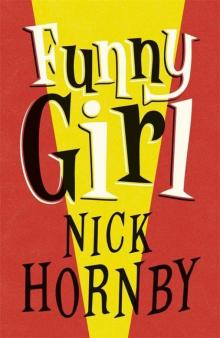 Funny Girl
Funny Girl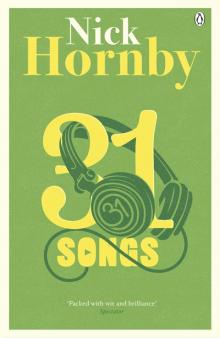 31 Songs
31 Songs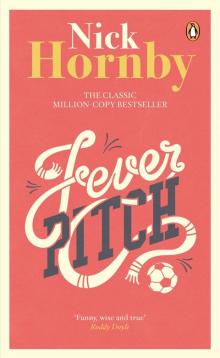 Fever Pitch
Fever Pitch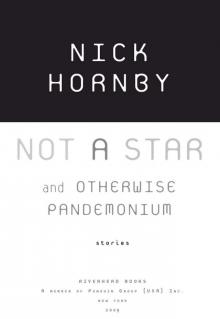 Not a Star and Otherwise Pandemonium
Not a Star and Otherwise Pandemonium The Complete Polysyllabic Spree
The Complete Polysyllabic Spree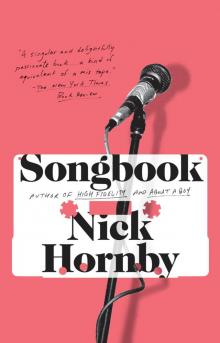 Songbook
Songbook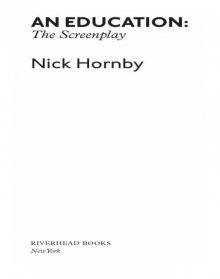 An Education
An Education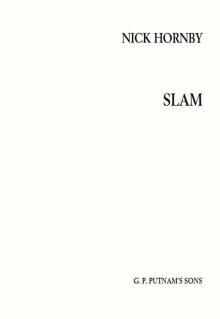 Slam
Slam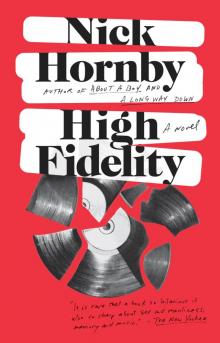 High Fidelity
High Fidelity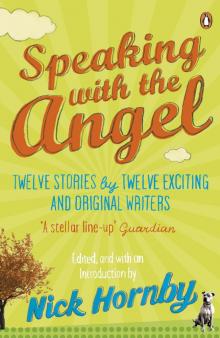 Speaking With the Angel
Speaking With the Angel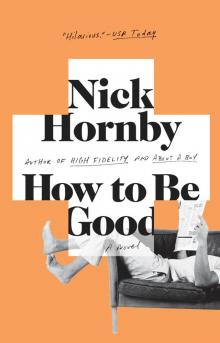 How to Be Good
How to Be Good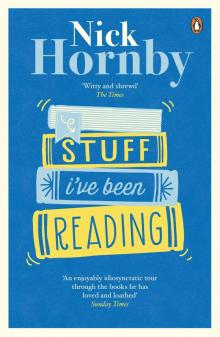 Stuff I've Been Reading
Stuff I've Been Reading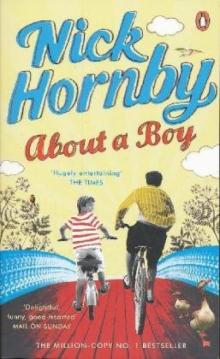 About a Boy
About a Boy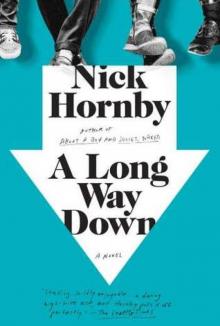 A Long Way Down
A Long Way Down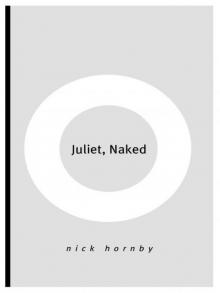 Juliet, Naked
Juliet, Naked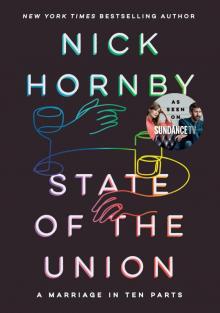 State of the Union
State of the Union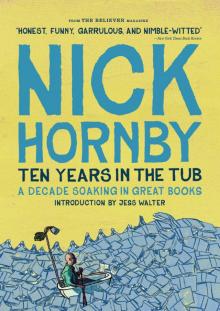 Ten Years in the Tub: A Decade Soaking in Great Books
Ten Years in the Tub: A Decade Soaking in Great Books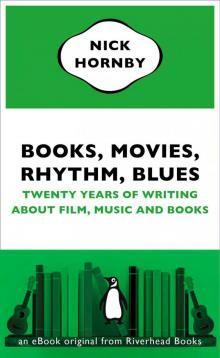 Books, Movies, Rhythm, Blues: Twenty Years of Writing About Film, Music and Books
Books, Movies, Rhythm, Blues: Twenty Years of Writing About Film, Music and Books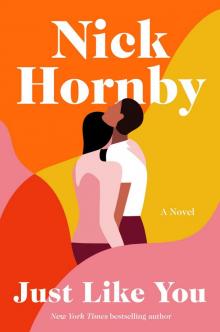 Just Like You
Just Like You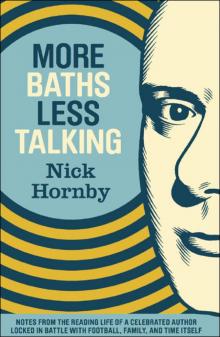 More Baths Less Talking
More Baths Less Talking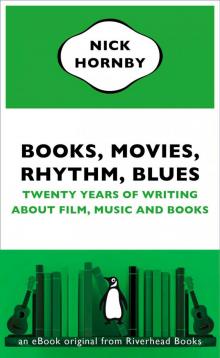 Books, Movies, Rhythm, Blues
Books, Movies, Rhythm, Blues